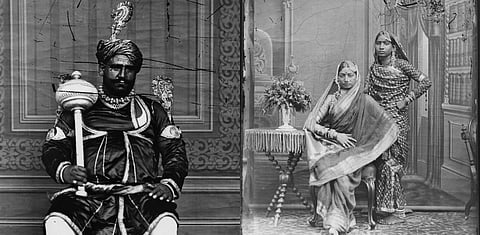

‘We the People’ is an exhibition by the Maharaja Sawai Man Singh II Museum at India Art Fair 2025, commemorating the 75th anniversary of the Indian Constitution. It explores the role of individuals in shaping India’s diverse identity through rare and significant works of art. By showcasing portraits from different periods, the exhibition examines identity through costume, gender, ethnicity, religion, and occupation, shedding light on how these aspects have evolved over centuries.
The adoption of the Indian Constitution in 1950 was a defining moment in the country’s democratic journey. However, ‘We the People’ challenges the conventional idea that visibility and agency for ordinary citizens emerged only with the Republic. Instead, it seeks to redefine narratives of power and representation by spotlighting lesser-seen individuals—both in the past and present.
Representing common folk
At its core, the exhibition presents two Jaipur-based portrait series. In the 1700s, court artist Ramji Das created watercolour portraits of palace servants, including guards, musicians, barbers, and nursemaids.
These are among the earliest known visual records of ordinary people in Indian courtly art. In the 1800s, Maharaja Sawai Ram Singh II, a pioneering photographer, captured similar subjects—his attendants and courtiers in strikingly intimate portraits.
These historical works are placed in dialogue with contemporary portraits by Mysore-based artist Suchender P., who depicts ordinary working people today. By juxtaposing artworks across centuries, the exhibition underscores the enduring nature of identity and representation. This interplay between past and present invites a deeper reflection on how individuals have been seen, portrayed, and remembered in Indian history over the last 250 years.
Breaking barriers
Speaking about the exhibition, HH Maharaja Sawai Padmanabh Singh of Jaipur stated, "It's very important to showcase the work we're doing at the Maharaja Sawai Man Singh II Museum, both to audiences in Jaipur and to those beyond. We want to do unconventional things and break barriers."
By bringing together historical museums and contemporary art, ‘We the People’ challenges the idea that questions of identity and representation are confined to history. Instead, it proves their continued relevance today, inviting audiences to reflect on who is seen, whose stories are told, and who remains invisible.